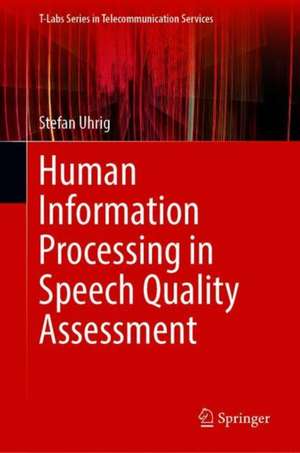Human Information Processing in Speech Quality Assessment: T-Labs Series in Telecommunication Services
Autor Stefan Uhrigen Limba Engleză Hardback – 4 iun 2021
| Toate formatele și edițiile | Preț | Express |
|---|---|---|
| Paperback (1) | 635.15 lei 6-8 săpt. | |
| Springer International Publishing – 5 iun 2022 | 635.15 lei 6-8 săpt. | |
| Hardback (1) | 641.20 lei 3-5 săpt. | |
| Springer International Publishing – 4 iun 2021 | 641.20 lei 3-5 săpt. |
Din seria T-Labs Series in Telecommunication Services
- 15%
 Preț: 640.55 lei
Preț: 640.55 lei - 15%
 Preț: 642.83 lei
Preț: 642.83 lei - 15%
 Preț: 639.25 lei
Preț: 639.25 lei - 24%
 Preț: 633.86 lei
Preț: 633.86 lei - 15%
 Preț: 642.03 lei
Preț: 642.03 lei - 20%
 Preț: 645.31 lei
Preț: 645.31 lei - 15%
 Preț: 644.63 lei
Preț: 644.63 lei - 20%
 Preț: 579.77 lei
Preț: 579.77 lei - 15%
 Preț: 641.53 lei
Preț: 641.53 lei - 15%
 Preț: 644.82 lei
Preț: 644.82 lei - 15%
 Preț: 638.24 lei
Preț: 638.24 lei - 20%
 Preț: 702.56 lei
Preț: 702.56 lei - 18%
 Preț: 999.45 lei
Preț: 999.45 lei - 15%
 Preț: 641.03 lei
Preț: 641.03 lei - 15%
 Preț: 637.46 lei
Preț: 637.46 lei - 18%
 Preț: 719.59 lei
Preț: 719.59 lei -
 Preț: 378.54 lei
Preț: 378.54 lei - 15%
 Preț: 639.08 lei
Preț: 639.08 lei - 15%
 Preț: 637.13 lei
Preț: 637.13 lei - 15%
 Preț: 642.68 lei
Preț: 642.68 lei - 15%
 Preț: 640.06 lei
Preț: 640.06 lei - 15%
 Preț: 652.31 lei
Preț: 652.31 lei - 15%
 Preț: 642.03 lei
Preț: 642.03 lei -
 Preț: 386.61 lei
Preț: 386.61 lei - 20%
 Preț: 552.67 lei
Preț: 552.67 lei - 15%
 Preț: 645.47 lei
Preț: 645.47 lei - 15%
 Preț: 636.94 lei
Preț: 636.94 lei - 15%
 Preț: 642.18 lei
Preț: 642.18 lei - 15%
 Preț: 632.70 lei
Preț: 632.70 lei - 15%
 Preț: 638.24 lei
Preț: 638.24 lei - 20%
 Preț: 648.95 lei
Preț: 648.95 lei - 18%
 Preț: 943.57 lei
Preț: 943.57 lei
Preț: 641.20 lei
Preț vechi: 754.36 lei
-15% Nou
Puncte Express: 962
Preț estimativ în valută:
122.71€ • 127.33$ • 102.56£
122.71€ • 127.33$ • 102.56£
Carte disponibilă
Livrare economică 22 februarie-08 martie
Preluare comenzi: 021 569.72.76
Specificații
ISBN-13: 9783030713881
ISBN-10: 3030713881
Ilustrații: XVI, 169 p. 45 illus., 41 illus. in color.
Dimensiuni: 155 x 235 mm
Greutate: 0.44 kg
Ediția:1st ed. 2022
Editura: Springer International Publishing
Colecția Springer
Seria T-Labs Series in Telecommunication Services
Locul publicării:Cham, Switzerland
ISBN-10: 3030713881
Ilustrații: XVI, 169 p. 45 illus., 41 illus. in color.
Dimensiuni: 155 x 235 mm
Greutate: 0.44 kg
Ediția:1st ed. 2022
Editura: Springer International Publishing
Colecția Springer
Seria T-Labs Series in Telecommunication Services
Locul publicării:Cham, Switzerland
Cuprins
Introduction.- Speech Quality Fundamentals.- Speech Quality Assessment.- Functional Model of Quality Perception.- Discrimination of Speech Quality Change Along Perceptual Dimensions.- Talker Identification Under Varying Speech Quality and Spatialization.- General Discussion and Outlook.- Conclusion.
Notă biografică
Stefan Uhrig received M.Sc. degrees in Psychology at the University of Giessen (2013) and in Human Factors at the Technical University (TU) of Berlin (2016). Since February 2017, he has been working as a researcher at the Quality and Usability Lab of TU Berlin.
Textul de pe ultima copertă
This book provides a new multi-method, process-oriented approach towards speech quality assessment, which allows readers to examine the influence of speech transmission quality on a variety of perceptual and cognitive processes in human listeners. Fundamental concepts and methodologies surrounding the topic of process-oriented quality assessment are introduced and discussed. The book further describes a functional process model of human quality perception, which theoretically integrates results obtained in three experimental studies. This book’s conceptual ideas, empirical findings, and theoretical interpretations should be of particular interest to researchers working in the fields of Quality and Usability Engineering, Audio Engineering, Psychoacoustics, Audiology, and Psychophysiology.
- Presents a new process-oriented approach towards speech quality assessment to uncover influences of speech transmission quality on human information processing;
- Proposes a multi-method assessment approach including subjective, behavioral, and neurophysiological levels of analysis;
- Reports findings from three experimental studies, that demonstrate interactions between perceived speech quality, contextual, and content-related influencing factors.
Caracteristici
Presents a new process-oriented approach towards speech quality assessment to uncover influences of speech transmission quality on human information processing Proposes a multi-method assessment approach including subjective, behavioral, and neurophysiological levels of analysis Reports findings from three experimental studies, that demonstrate interactions between perceived speech quality, contextual, and content-related influencing factors
